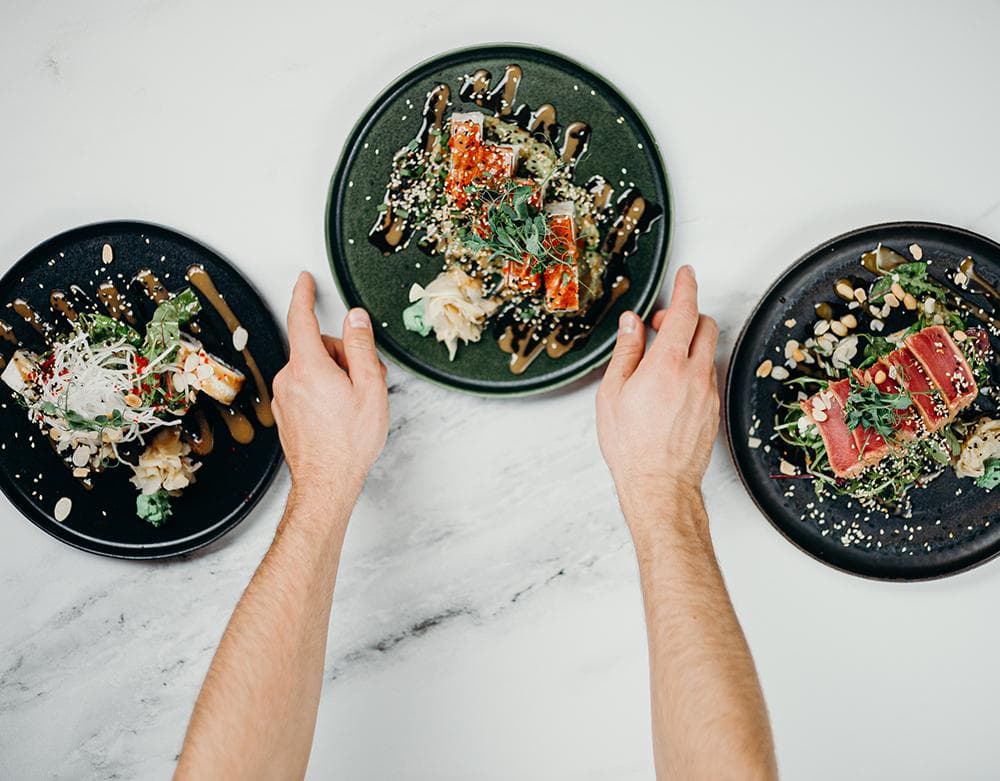
Get Found Locally - Digital Marketing for Restaurants
Digital marketing has become increasingly important for local restaurants to attract new customers, retain existing ones, and boost their online presence.
However, digital marketing can be overwhelming, especially for those who are new to it. Restaurants can achieve great success by utilizing basic local SEO practices for their website. In addition to having just a website, local SEO involves optimizing a business's Google Business Profile listing, leveraging social media for local SEO, building local citations and backlinks, and managing online reviews to improve local visibility.
In this guide, we'll focus on optimizing your website's SEO locally, and how to do some basic keyword research aimed at restaurant businesses. This article assumes the reader already has at least an idea for a restaurant, an idea for a menu, a niche or theme, and an understanding of their target audience.
What is "local" SEO?
Before we dive into local SEO, we need to have an understanding of SEO. SEO, or Search Engine Optimization, is the practice of improving the quality and quantity of website traffic by increasing the visibility of a website or a web page in a search engine's unpaid results.
In other words, SEO involves making changes to a website or its content to make it more attractive to search engines such as Google, Bing, or Yahoo, so that the website ranks higher in the search engine results pages. The goal of SEO is to help search engines understand the content and relevance of a website or web page so that they can deliver the most relevant and useful results to their users.
Local SEO on the other hand is a subset of SEO that focuses specifically on improving a business's visibility in local search results. Local SEO is aimed at attracting local customers who are searching for businesses or services in their immediate area.
Local SEO involves optimizing a business's website and online presence for location-based searches, such as "ramen restaurant near me" or "best coffee shop in [city name]". Optimizing local SEO should be a priority for businesses that have a website but cannot have products or services delivered online.
It's crucial that your business be listed on the first page of the search results on Google as 92% of users will select business on the first page. You absolutely don't want to be on the second page, or even worse, the third page. Just remember the age-old internet joke: Where is the best place to hide a dead body? -- On the second page of Google, no one will find it.

Building your website
Having a website CMS (Content Management System) such as WordPress or Squarespace will help you get started on building a website very easily. Chances are, your website will be the first thing that people look at before even stepping foot into it. 97% of consumers will search online to find a local business first.
However, having a nice-looking website is only a small portion of attracting customers. We need to optimize the SEO to make sure people see it when searching on Google. A beautiful website is useless if no one can see it.
SEO optimization takes a lot of time and is often very meticulous. The title of each page, the amount of text on a page, the amount of images or videos on each page, the meta descriptions, the list goes on and on. But for brevity's sake, let's just discuss the local stuff.
Long-Tailed Keywords
For content, localized long-tailed keywords are the heavy hitters. You can use keyword research tools such as Semrush and Moz, to find out which ones are popular, both have a 30-day free trial for you to begin researching.
You should find keywords that are somewhat popular, but not TOO popular. Most people who are new to SEO optimization tend to focus on keywords that are either too broad or too difficult.
Trying to get on the first page of Google for a popular keyword such as "hamburger" might be an impossible task for a new restaurant business. You'll be up against McDonald's, ShakeShack, BurgerKing, Smash Burger, and many many other big competitors. To build yourself up, you're going to need to work your way up.
That's where long-tailed keywords come into play. Long-tailed keywords are longer keywords that are meant to narrow or specify certain searches. In general, the longer the keyword, the more specific it is. For example, "hamburger" is such a broad keyword. We aren't really sure what the user is searching for; it could be restaurants, recipes, images, videos, or even the fictional stand-up comedian Neil Hamburger. So we need to narrow it down based on the user's intent.
To narrow down the keyword, we can add words to specify intent, such as "hamburger restaurants." We now know that the user is looking for restaurants serving hamburgers. Even then, the keyword is still quite broad, as there are tens of thousands of hamburger restaurants in the United States, so adding more words to it will continue to narrow it, such as " hamburger restaurants in new york city."
Now, we're in the local SEO territory. A person who is searching for a restaurant serving hamburgers in New York City is probably looking to go into one to eat. If competition is still too fierce, you can narrow it down even further to "vegan hamburger restaurants in new york" to specify it into your niche or theme.
Go broad, then narrow down
How do we even find a keyword for restaurant businesses? To find an effective one, you'll first need to think of a broad keyword. We'll be using Semrush's keyword research tool to show you how we go about doing some basic research. There are several ways of doing this but let's keep it simple.
If you're just opening a new pizza restaurant, for example, the most obvious keyword is "pizza." We'll take our keyword and put it into Semrush's Keyword Overview tool to see what we get back.

Our Semrush keyword research tool says it's a very hard keyword to rank for, having over 1.8 million searches in the US over the last 12 months. We need to make the keyword narrower and more specific to our pizza restaurant business.
Let's say you're opening up in East Hampton, New York and we need to optimize our local SEO for the Hampton area. We can make it more specific for our location by searching "pizza restaurants in east hampton." By adding the location, "east hampton", in our search query, we're optimizing our keyword search for local SEO.
Intent is King in SEO
Note: Function Keywords for local SEO
Google is smart enough to get rid of function words, or words that shouldn't affect the intent of users' search, such as the preposition "in" in this case so the search query will be "pizza restaurants east hampton." Other function words that are ignored are conjunctions ("and" and "but"), articles ("a" and "the") and other prepositions ("to" and "for"). This gives you a lot of space to get creative with content for your web page.
Note: Plurals for local SEO
However, for "restaurants" and "restaurant," John Mueller from Google mentions that there is a slight difference in intent when we pluralize words, and Google recognizes these 2 keywords as different, but also synonyms.
A user who pluralizes a word, such as "restaurants" could be looking for a list of restaurants in an area, such as "top 10 best pizza restaurants in NY," while a singularizing a word may have a different intent, such as finding the best pizza restaurant with "the top pizza restaurant in NY."
If you're interested in learning more about how Google parses Google search results, you can check out their Google Ads' Keyword Close Variants section. Google Ads and SEO for Google have some differences, but SEO keywords and PPC broad match search queries are treated essentially the same. However, keywords for SEO aren't paid per click, so you don't have to think of a budget as you do for Google Ads.

"the top pizza restaurant in NY" yields no results in the US within 12 months
Seems like this isn't a popular keyword or that it's just too narrow as there are no searches for this keyword within 12 months. This keyword probably isn't worth the effort and wouldn't benefit our restaurant very well. We can play with this keyword by broadening it (cutting out words), narrowing it (adding words), and rearranging the words. Let's try "pizza east hampton" and "east hampton pizza," which should yield different results.

"pizza east hampton" is a high-volume keyword and isn't considered too difficult.

Swapping the keywords to "east hampton pizza" will yield different results.
There we go! These results are more realistic for our new restaurants to rank for. Though 590 and 140 aren't huge numbers, we also have to take into consideration the population of the area that we are in. East Hampton NY and Manhattan NY are massively different in terms of search volumes and the number of potential customers. So don't be discouraged if the number doesn't seem so high if your local area isn't a bustling metro area. Quality over quantity is okay.
From here, you can find related long-tailed keywords that include the local area of your business that can help you rank on Google searches. Just remember to take your time finding quality keywords, and that optimizing your SEO is an investment of time.
Don't forget basic SEO best practices
Remember to consider basic SEO for page content; a page should have around 2-3 keywords targeted but only 1 primary keyword, and you should include them in several places on one of your website pages. For a better user experience, make sure to place them naturally in the contents of your web page and try not to sound too robotic.
Also, remember to avoid stuffing the page full of targeted keywords, hiding keywords behind images, or changing the text color to white. Google will penalize your page's SEO for keyword stuffing and other Black Hat SEO tactics.
Putting these keywords in your website SEO title, including them in your meta description for the page, having them in the alt-text of images, and including them several times throughout the page will help out your local SEO for the restaurant. An example of an SEO title would be, "Miyabi | The go-to restaurant for Pizza in East Hampton."
If you're starting you're a small business looking for a digital marketing company in the Hamptons or your mid to large-size business is looking for a marketing consultant to improve your SEO, local digital marketing companies in the Hamptons like Miyabi Marketing can help assist you in your marketing efforts.
